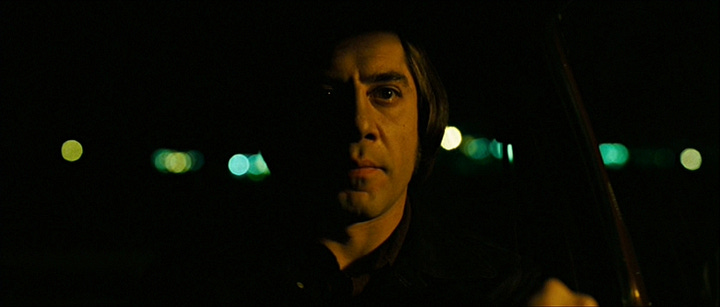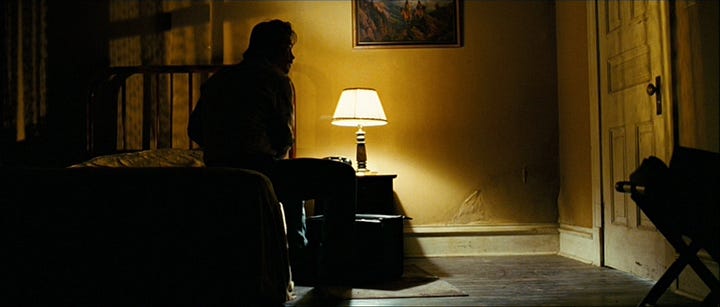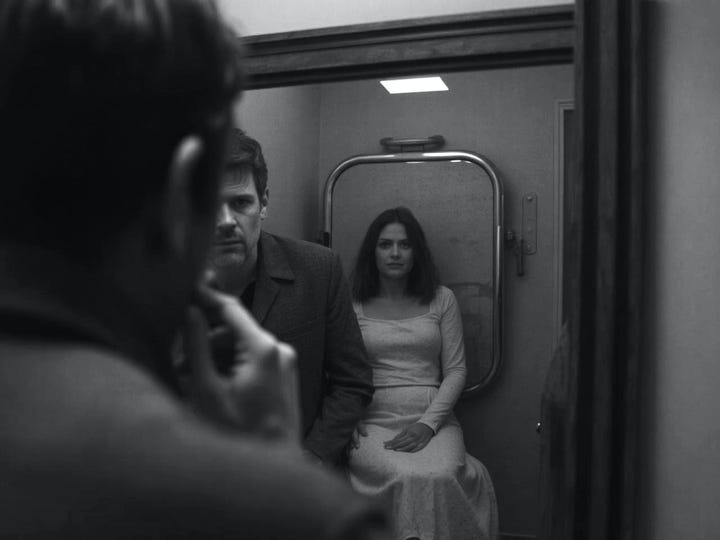IN SUMMARY:
“McCarthy’s The Passenger and Stella Maris arrive as the literary titan’s profound final coda, a challenging and entrancing journey through the boundaries of perception and intellect. These final works don’t so much invite the reader in as they do throw down the gauntlet, entwining esoteric musings with the raw pulse of human frailty, forming an existential panorama that defies narrative comfort and rewards those willing to traverse its expansive depths. McCarthy's prose gasps, and trembles. In this grand farewell, it feels as monumental as the American tradition itself, though what we have in our possession today remains largely a mystery.”
Once announced, the release dates of the final two Cormac McCarthy novels came as a revelation and a gasp after so many years of speculation. At one point, with the success of The Road (2006) and No Country for Old Men (2007) as Pulitzer Prize, and Oscar-winning productions, respectively, The Passenger was one of the most anticipated novels amongst the public at large. Cormac McCarthy had become almost a household name.
And then, over time, the novel faded from the public view, confirmed “indefinitely delayed” by press agents. By 2016, I accepted that we would probably only ever have the final works unearthed posthumously, if at all.
Imagine my learning then—six more years later, in 2022—that we would be getting not only one but two works from my favorite living author in the same year. I was delighted, but I was also on the very cusp of fatherhood. When McCarthy died in 2023, it made my reading of The Passenger (2022) and Stella Maris (2022) almost self-confrontational. I had to make the time an get around to these works.
At sixteen or seventeen, I was hooked on books like McCarthy’s, Denis Johnson’s, and William Faulkner’s. Spines like McCarthy’s Child of God (1973), Suttree (1979), Blood Meridian (1985), Denis Johnson’s Angels (1983), Jesus’s Son (1992), Tree of Smoke (2007), and, graduating to The Sound and the Fury (1929), Light in August (1932), and Absalom, Absalom! (1936) stared out at me at all times (particularly, and surprisingly, over a phase of my living in South Korea). I had become a kind of reader through my extensive contact with McCarthy and similar writers.
I spoke briefly about the challenge of expectation in my review of Todd Philips and Joaquin Phoenix’s Joker sequel, and it’s relevant here too: The Passenger and Stella Maris also had an almost immediate fizzling out following their critical reception, released two years ago this month, largely forgotten, or largely unread . . . “What happened?” we must ask in both cases to draw these works to wider attention.
It is an even more radical departure atmospherically, tonally, and stylistically than Folie à Deux, which even I cannot fully endorse, as discussed in my review of that film. They’re not in the same league among personal influences but I recommend these works with qualification in both instances—that is the connective tissue. This is the kind of work—polarizing books and movies, artifacts of culture that tend to divide people—that I tend most gravitate toward, and which you can expect to see explored on this channel; it’s the kind of work that interests me.
Subscribing to the philosophy of Dr. Stangelove (1964) and 2001: A Space Odyssey (1968) director Stanley Kubrick here, when picking up the pen or clacking away on this keyboard, I hope that people love the work I produce, or that they hate it . . . anything but indifference. Sometimes I fail to live up to this ideal myself, but—when possible. I say: approach your work like that. Always go for boldness over safety. McCarthy’s No Country for Old Men ends in such absolute defiance of narrative comfort: love or hate that ending, no one is “indifferent” to it.


Returning to the novels at hand, it is possible to read the works in either order. Released first, and finishing at almost twice the page count of Stella Maris, The Passenger is obviously the intended focal point and point of entry, both from a marketing and technical standpoint, though they could just as well be read in the reverse order, perhaps even to enhanced effect upon re-reading.
It’s a hell of a novel to “start the finish” on, The Passenger—a geographically and conceptually sprawling, existential journey that defies easy classification. Is this realism or science fiction? Are we following the thoughts of the conscious mind or the remnants of a dream? The narrative refuses to settle into one genre or theme, instead weaving together philosophical musings, metaphysical questions, and raw human experience. It touches on physics, mathematics, trauma, and the slipperiness of reality itself.
In Stella Maris, we encounter Alicia Western, a mathematical prodigy and tragic incestuous love, and sister to Bobby Western. Set primarily within a psychiatric institution, the novel unfolds as a series of dialogues between Alicia and her therapist, Dr. Cohen. Here, McCarthy focuses on her philosophical obsessions with mathematics, consciousness, and the nature of reality, exploring her complex internal world in isolation from the external events that drive The Passenger. Which is to say: those events in this series (real or imagined) that take place outside these institutional walls. Through these intensive conversations, Alicia reveals a tragic awareness of her mind’s depths and her relentless search to grasp a reality that feels so elusive to her.
The novels offer a dual exploration of mind and matter, introspection, and action, as McCarthy probes the boundaries between human intellect and the unyielding enigma of consciousness, reality, and existence itself. It’s that grand. As a potentially negative consequence, this more ponderous, theorizing tendency does causes both novels to meander more in plot and pacing than McCarthy’s other twentieth-century works.
The books are vast, intricate landscapes. Don’t rush, don’t force clarity, and do not expect a clean narrative resolution. Enter with an explorer’s (or a “frontierman’s”) mindset, taking McCarthy’s language as a map for thought, and allow the narrative’s mysteries to unfold. Pause and meditate on Alicia’s monologues and Bobby’s quiet reckonings with the void. And then on a meta-level, he pulls back, letting order and cohesion in the plot dissolve—almost as if mirroring the elusive nature of truth his characters struggle to grasp. Take the following as an example:
You will never know what the world is made of. The only thing that’s certain is that it’s not made of the world. As you close upon some mathematical description of reality you cant help but lose what is being described. Every inquiry displaces what is addressed. A moment in time is a fact, not a possibility. The world will take your life. But above all and lastly the world does not know that you are here. You think that you understand this. But you dont. Not in your heart you dont. If you did you would be terrified. And you’re not.
This quote from The Passenger leaves me trembling. It channels McCarthy’s influences, portraying human struggle as “self-conscious”—echoing the Biblical story of Job and Milton’s Adam wrestling with his choices in a world heavy with sin. It also recalls the towering figure of American literature, Herman Melville, whose influence is inseparable from McCarthy's work. Beneath the text lies an abyss—not a diegesis, but more like the vast, uncertain sea in Moby-Dick (1851), symbolizing the unknown.
In Stella Maris, we learn that Alicia’s brother, Bobby, died in a racing accident in Europe before she was even hospitalized. Bobby’s racing is barely mentioned in The Passenger. If this is true, then the entire second half of the novel becomes, in a sense, the moment before death—Bobby’s life flashing before his eyes in the explosion. It’s unlike anything I’ve ever read. Was the entirety of the first novel just a dream? What fascinates me most, as a student of fiction, is how McCarthy provides just enough information to sustain the illusion and the satisfying “suspension of disbelief.”


In this case, “the theme is the plot, and the plot is the theme.” McCarthy’s focus isn’t on “what happens” but on “what it means.” With these works, he invites readers to see action and meaning as one and the same, blending the symbolic seamlessly into the literal.
There’s so much more to unpack here than I can cover in a single review or even within my own current understanding—which is good because there’s another group of readers I want to speak to directly. Just to clarify: this isn’t Finnegans Wake (1939)—it’s not indecipherable, even if it shares some of that novel’s complications. I had to pause on my first reading attempt . . . several times, actually. It wasn’t just about saying goodbye to McCarthy’s work; I was genuinely stunned by the “unexpectedness” and sheer “indescribability” of it.
There’s an endless amount to explore in these novels. But here, I’d like to reach out to some of McCarthy’s fans who might feel put off by the difficulty at first glance. McCarthy has followers beyond the usual literary crowd—The Road and No Country for Old Men attracted a wide audience, including those who usually spend more time with screens than books. The Passenger and Stella Maris pose a far greater challenge but this is the same author you’ve admired—you’ll find guideposts (all the usual staples) to help you find your way.
The first night he spent in a motel outside of Midland Texas. Pulling in off the highway at some hour past midnight. The cool air that blew in the windows of the truck bearing the smell of crude oil from the wells. The lights of a distant refinery burning out there on the desert like the rigging of a ship. He lay a long time in the cheap bed listening to the rap of the diesel trucks running up through the gears as they came out onto the highway from the truckstop a mile down the access road. He couldnt sleep and after a while he got up and pulled on his shirt and jeans and his boots and walked down the breezeway and out across the fields. Quiet. Cold. The fires from the pipes at the wells burning like enormous candles and the lights of the town washing out the stars to the east.
Can prose get more cinematic than this? Can it be clearer, more assured? Despite the narrative’s (or anti-narrative’s) twists and turns, McCarthy never lets us lose our way. Works this ambitious often falter by missing some undefinable “balance”—or by not trusting that readers will pay close enough attention. But McCarthy has the courage to hold that trust.
What gives The Passenger and Stella Maris their weight is their undeniable sense of reality, as if the texts themselves are alive, breathing. Each sentence pulses with life. We hold the master’s hand, guiding us toward something irrevocable. His prose shivers and gasps, and we become his companions in this final farewell. Like Beckett’s empty stage where the breath finally ceases, we’re left confronting the fractured nature of self and legacy.






This Duology has definitely been something I’ve thought about often. It feels like there is something vast underneath that I’m not grasping, especially in regards to the strange incestuous aspects of the relationship between the two.
On Cormac McCarthy’s The Passenger (and Stella Maris) absolutely brilliant!! I started reading Stella Maris first because it was on the shelf in the library and half way through I decided to go back and read The Passenger- which just blew me away!! How does he know? Of course, now I will never get to ask him. Mccarthy goes on my list now- the one that answers the question “if you can have dinner with one person living or dead…?” ( right after Dr. Oliver Sacks) so many questions- this is my genius list…